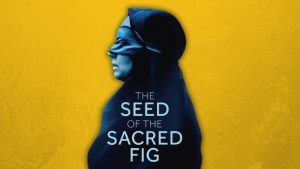 The Seed of the Sacred Fig ★★★½
The Seed of the Sacred Fig ★★★½
THERE won’t be any premieres of The Seed of the Sacred Fig in Iran.
Mohammad Rasoulof, writer and director of this much-praised political drama, fled his home country under threat of eight years in prison.
Despite being previously arrested for spreading anti-government propaganda, Rasoulof filmed The Seed of the Sacred Fig in secret with a small cast and crew over 70 days during 2023.
When news of his imminent arrest broke, the Iranian director embarked on a month-long trek to Germany where he was given refuge along with the precious footage.
In Germany Rasoulof and his English editor Andrew Bird merged the fictional footage with actual vision of violent government crackdowns on public demonstrations in the streets of Tehran.
The result of their achievements, both in the finished product and the effort required to make the film at all, has been securing the Special Jury Prize at the 2024 Cannes Film Festival as well as ongoing international awards recognition.
Hopefully this is some comfort to the cast members who weren’t able to get out of the country as well as Rasoulof who may never return.
Certainly the authoritarian regime will have plans for the man who has been a regular, outspoken critic across eight films since the early 2000s, most of which probably had to be made in a similar fashion.
The Seed of the Sacred Fig isn’t the first film to combine factual and fictional footage through a guerrilla-style approach, but it also doesn’t happen that often.
Rasoulof’s fictional story is filmed with an urgency and tension that reflects the events that were occurring at the same time in the streets outside.
The demonstrations and violent suppression by the authorities are captured either from the windows of apartments or, when able to, at street level using mobile phone cameras.
Director and editor do a masterful job of knitting the material together in a manner that creates a relatively seamless narrative and propels the drama in ways that couldn’t have otherwise been achieved.
The other strength of the film is the acting which obviously reflects not only talent but a resolute commitment to making a political statement.
A title card at the start of the film explains that a particular species of fig spreads by wrapping itself around another tree and eventually strangling the life from it, a symbol of the government’s impact on the lives of its citizens.
The story concentrates on how one family is slowly being torn apart by the divisions created and enforced.
Missagh Zareh plays Iman, Soheila Golestani his wife Najmeh and Mahsa Rostami and Setareh Maleki their teenage daughters Rezvan and Sana.
As a lawyer, Iman has been able to provide a relatively comfortable life for the family. But he is offered the chance to make their lives even better with a promotion to the position of an investigating judge on the Government’s Revolutionary Court.
Imam takes the job but soon discovers he is simply being used as a tool in the regime’s prosecution of the increasing number of demonstrators and critics.
His moral quandary is made worse by the questioning of his daughters who, like many of their generation, are angered by not having access to the basic freedoms of thought that other populations enjoy.
The disappearance of a gun from Imam’s bedside drawer is the catalyst for a conflict within the family that mirrors what is happening on the streets below.
Apart from the quality of film-making in its own right, the overall achievement makes it even more essential viewing.
Watched at the cinema.